Unit12练习+讲义
Unit+12+讲义 人教版七年级英语下册

Unit 12 What did you do last weekend?1.---Who visited her grandmother?---Becky did.答语中did代替句中visited her grandmother.(英语中为了避免重复,经常用does、do、did等来代替前面的动词或相关内容,且时态与问句保持一致)Eg:---Who cooks dinner for you every day?---My father does.(代替cooks dinner)---Do you like watching TV?---Yes,I do.(代替like watching TV)2.I worked as a guide at the Natural History Museum.as:(prep)当作;作为(其后常接表示职业、用途等的名词) 若放在句首,则常用逗号与语句的主体隔开Eg:She works as a giude in a company.As a player, you should do more exercise.辨析:as&likeas: 用于说明同一关系,即两者实为一体like:用于说明相似关系,并不等同Eg:He works as a teacher.(言外之意:He is a teacher.)He works like a teacher.(言外之意:He isn’t a teacher.)3.I stayed up late to watch the soccer game.stay up:熬夜stay up late:睡得很晚与stay相关的常见短语:stay at home待在家里stay away from远离stay healthy保持健康stay out 待在外面与up相关的短语call up 打电话catch up with 赶上come up with提出get up 起床give up放弃grow up 成长look up 向上看;查出make up编造;构成pick up 捡起;中途载人put up 举起;张贴set up 创建show up出现take up 占据turn up调大use up用完;耗尽4.Father mouse shouted at the cat, “Woof,woof.”辨析:shout at &shout toShout at:冲...大声叫喊(多指因生气/愤怒冲某人叫喊)Eg: He loses his temper and shouts at me.shout to:对...大声叫喊(无恶意,多因距离远)Eg: : “Can you hear me?”he shouts to Tom.5.“Well,son,that’s why it’s important to learn a second language.”(1)that’s why...这就是...的原因why引导的名词性从句在句中作表语Eg:That’s why I can pass the important exam,because I study hard. that’s because...那是因为...(表示原因)Eg:He didn’t go to school trip. That’s because he was badly ill.6.flew a kite 放风筝flew为fly的过去式fly的用法:(vi)(1)fly to乘/坐飞机=go (to)...by plane/airEg:She will fly to New York. She will go to New York by plane/air.(2)飞Eg:He hopes he can fly like a bird.(3)飞逝Eg:How time flies! (时光飞逝)(4)苍蝇Eg:Look! A fly is swimming in the porridge.7.There we put up our tents and made a fire to keep us warm and cook food on.(1)put up:搭建;张贴(动副结构)(2)keep的用法Keep sb./sth.+adj 让某人/某物保持...(强调某种状态)Eg:The coat will keep you warm.The students should keep the classroom clean.Keep sb./sth.+doing 让某人/某物一直...(强调动作的持续性)Eg:I’m sorry I’ve kept you waiting.8.The next morning,my sister and I got a terrible surprise.get a surprise 吃惊(可数名词)surprise:(不可数名词)in surprise惊奇地;惊讶地To one’s surprise 令某人惊讶的是(vt)使吃惊;使惊奇(adj)surprising surprisedEg:Her idea surprises me.9.I was so scared that I couldn’t move.(1)so...that...如此...以致于... (so后接adj/adv)Eg:The box is so heavy that I can’t carry it.He runs so fast that I can’t catch up with him.拓展:such+a/an+adj+单数可数名词+that...相当于so+adj+a/an +单数可数名词+that...Eg:Mr. Yi is such a kind teacher that we all like him. Mr. Yi is so kind a teacher that we all like him.(2)scared:惊慌的;吓坏了的=afraidbe scared of sth. 害怕做某事be scared to do sth.害怕做某事Eg:Miss Zhang is scared/afraid of the ghost.The little boy is scared/afraid to read in fornt of the others.10.感叹句(what/how )。
Unit 12 What did you do last weekend讲义及答案

Unit 12 What did you do last weekend?(讲义)Part 1 Words and Expressionscamp /k?mp/ v. 扎营;搭帐篷lake /le?k/ n. 湖;湖泊beach /bi?t?/ n. 海滩;沙滩badminton /'b?dm?nt?n/ n. 羽毛球运动sheep /?i?p/ n. 羊;绵羊prep. & adv. as /?z/ 作为;当作adj. 自然的natural /'n?t??r?l/n. butterfly /'b?t?(r)fla蝴蝶?/n. 游客;访问者?t?(r)/ visitor /'v?zadj. 疲倦的;疲劳的tired /ta??(r)d/v. / 停留;待stay /ste?深夜不睡;熬夜stay up lateadv. 离开;远离away /?'we?/跑开run awayn. (pl. mice /mas/ ?s/) 老鼠;耗子mouse /ma?adj. 幼小的n. baby /'be?bi/ 婴儿v. 呼叫;喊叫?shout /a?t/冲? shout at …?大声叫嚷interj. ?woof /wf/ (狗叫声)汪汪n. 语言/ dlanguage /'l??gw??v. (flew /flu/ ?/)飞?fly /flan. 风筝t/ kite /ka?放风筝fly a kiteadj. & adv. 高的(地)/ high /ha?中学high schooladv. ago /?'g?以前/ ?n. ndi?/India /'?印度n. 帐篷tent /tent/搭起;举起put upn. 月亮n/ ?moon /mun. 惊奇;惊讶v. z/ ?surprise /s?(r)'pra使吃惊吃惊get a surprisen. snake /sne蛇k/ ?页 1 第scared /ske?d/ adj. 惊慌的;吓坏了的move /mu?v/ v. 移动shout to…对??大声喊叫start /stɑ?(r)t/ v. 开始;着手jump /d??mp/ v. 跳;跃up and down 上上下下;起伏wake /we?k/ v.(woke/ w??k/)弄醒;醒wake…up 把??弄醒forest /'f?r?st/ n. 森林into /'?nt?/ prep. 到??里面;进入ear /??/ n. 耳朵Lucy /'lu?si/ 露西(女名)wake v.(woke/ w??k/)弄醒;醒wake…up 把??弄醒The shouting waked up Jim.The shouting waked Jim up.Please wake me up at five.wake…up 名词作其宾语,放在或均可,。
沪教版五年级上册英语Unit 12 Fire讲义(教师版)

Unit 12 Fire一、重点词汇及拓展1. fire n. 火;火灾短语:put out fires 灭火make the fire 生火e.g. Most animals are afraid of fire. 大多数动物怕火。
2. burn v. 燃烧;烧拓展:burning adj. 烧着的短语:burn down 烧毁e.g. How do you burn your feet? 你的脚怎么烧伤的?3. hurt v.(使)受伤短语:get hurt 受伤e.g. Do you hurt yourself? 你伤到自己了吗?4. must v. 必须(情态动词)拓展:mustn’t 禁止;不许e.g. I must telephone my parents. 我一定要给父母打电话。
5. careful adj. 小心的拓展:carefully adv. 小心地短语:be careful! 小心!be careful with sth/sb 当心...e.g. Be careful, the plates are hot. 小心,盘子烫手。
6. safety n. 安全拓展:safe adj. 安全的dangerous adj. 危险的danger n. 危险短语:safety first 安全第一e.g. Safety is important. 安全至上。
7. smoke v. 吸烟n. 烟;烟雾拓展:smoky adj. 烟雾弥漫的短语:Don’t smoke!=No smoking! 禁止吸烟!e.g. He doesn’t smoke or drink. 他不吸烟不喝酒。
8. match n. 火柴(复数:matches);比赛v. 匹配拓展:play with matches 玩火柴e.g. The match lights easily. 这火柴容易点燃。
9. heat n. 热;高温e.g. The heat makes him feel bad. 高温使他觉得难受。
牛津四年级下册同步讲义Unit12
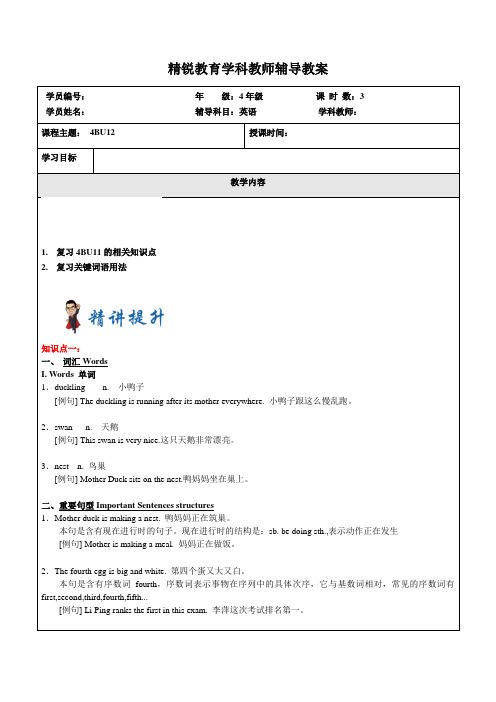
精锐教育学科教师辅导教案学员编号:年级:4年级课时数:3学员姓名:辅导科目:英语学科教师:课程主题:4BU12 授课时间:学习目标教学内容1.复习4BU11的相关知识点2.复习关键词语用法知识点一:一、词汇WordsI. Words 单词1.duckling n. 小鸭子[例句] The duckling is running after its mother everywhere. 小鸭子跟这么慢乱跑。
2.swan n. 天鹅[例句] This swan is very nice.这只天鹅非常漂亮。
3.nest n. 鸟巢[例句] Mother Duck sits on the nest.鸭妈妈坐在巢上。
二、重要句型Important Sentences structures1.Mother duck is making a nest. 鸭妈妈正在筑巢。
本句是含有现在进行时的句子。
现在进行时的结构是:sb. be doing sth.,表示动作正在发生[例句] Mother is making a meal. 妈妈正在做饭。
2.The fourth egg is big and white. 第四个蛋又大又白。
本句是含有序数词fourth,序数词表示事物在序列中的具体次序,它与基数词相对,常见的序数词有first,second,third,fourth,fifth...[例句] Li Ping ranks the first in this exam. 李萍这次考试排名第一。
No parking!句型b:Let's(us,me)+not +动词原形~.Don't let +第三人称代词的宾格或名词+动词原形.Let's not say anything about it.Don't let them play with fire.知识点三:I.用所给词的适当形式填空。
Unit12 Life is full of the unexpected讲义 人教版英语九年级全册
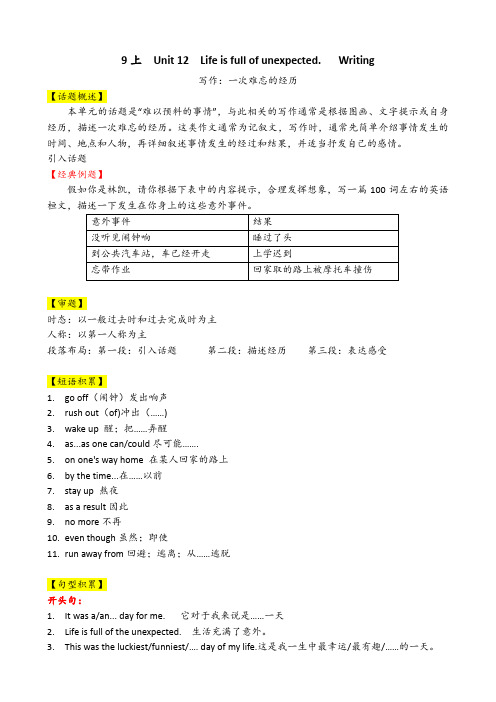
9上Unit 12 Life is full of unexpected. Writing写作:一次难忘的经历【话题概述】本单元的话题是“难以预料的事情”,与此相关的写作通常是根据图画、文字提示或自身经历,描述一次难忘的经历。
这类作文通常为记叙文,写作时,通常先简单介绍事情发生的时间、地点和人物,再详细叙述事情发生的经过和结果,并适当抒发自己的感情。
引入话题【经典例题】假如你是林凯,请你根据下表中的内容提示,合理发挥想象,写一篇100词左右的英语桓文,描述一下发生在你身上的这些意外事件。
【审题】时态:以一般过去时和过去完成时为主人称:以第一人称为主段落布局:第一段:引入话题第二段:描述经历第三段:表达感受【短语积累】1.go off(闹钟)发出响声2.rush out(of)冲出(……)3.wake up 醒;把……弄醒4.as...as one can/could尽可能…….5.on one's way home 在某人回家的路上6.by the time...在……以前7.stay up 熬夜8.as a result因此9.no more不再10.even though虽然;即使11.run away from回避;逃离;从……逃脱【句型积累】开头句:1.It was a/an... day for me. 它对于我来说是……一天2.Life is full of the unexpected. 生活充满了意外。
3.This was the luckiest/funniest/…. day of my life.这是我一生中最幸运/最有趣/……的一天。
中间句:1.By the time I..., ... had... 当我……时,……已经……2.When I..,I found/realized that... 当我……时,我发现/意识到……3.As a result,I... 因此,我……4.I was so...that I... 我太……了,以至于我……5.I couldn't believe..我无法相信……结尾句:1.What a/an..day!多么……一天啊!2.I will always remember...我会永远记得……【范文欣赏】I will never forget what happened today. It was an unlucky day for me.I stay ed up late last night. I was so sleepy that I didn't hear the alarm go off.I overslept. I didn't have breakfast and rush ed out as quickly as I could. But when I got to the bus stop, the bus had already left. As a result, I was late for school. What was worse, by the time I walk ed into the classroom, I realized I had left my homework at home. I had to get it. Unluckily, on my way home, I was hit by a motorbike.I had a great pain in my arms and had to go to the hospital.What an unlucky day I had today! I will always remember the special day.【译文】我永远不会忘记今天发生的事情。
沪教版四年级下册英语Unit 12 The ugly duckling讲义

Unit 12 The ugly duckling 一、基本知识点(一)词汇:ugly [ˈʌgli] 丑陋的duckling [ˈdʌklɪŋ] 小鸭duck [dʌk] 鸭子river [ˈrɪvə(r)] 河,江baby [ˈbeɪbi] 宝宝,婴儿later [ˈleɪtə(r)] 后来,以后quack [kwæk] (鸭叫声)嘎嘎back [bæk ] 背,背部away [əˈweɪ ] 去别处,朝另一个方向swan [swɒn] 天鹅into [ ˈɪntə ] 朝,向,到……里面(二)短语:near the river 在河边three small eggs 三个小蛋a big egg 一个大蛋on her back 在她背上have no home 没有家in the grass 在草里look into the water 看向水里(三)句型:1.表天气It's ...2. There be 某地有某物,就近原则3.There be 与have 的区别There be 某地有某物have 人拥有…(四)重难点、易错点:There be 与have 的区别:There be 某地有某物;have 人拥有…二、典型例题1. ( ) This plant _____ small. _____ flower are small too.A.is; It’sB.is, They’reC.is; Its【解析】答案:C。
第一空的主语为第三人称单数,故用is。
Its表示“它的”。
2.( )Please look _____ the blackboard and listen _____ me.A. in; toB. at; toC.at; in【解析】答案:B。
look at 看;listen to“听...”。
3.( ) There _____ some milk and a few apples on the desk.A.areB. isC. .have【解析】答案:B。
09年自考“英语(二)”完整讲义(121)
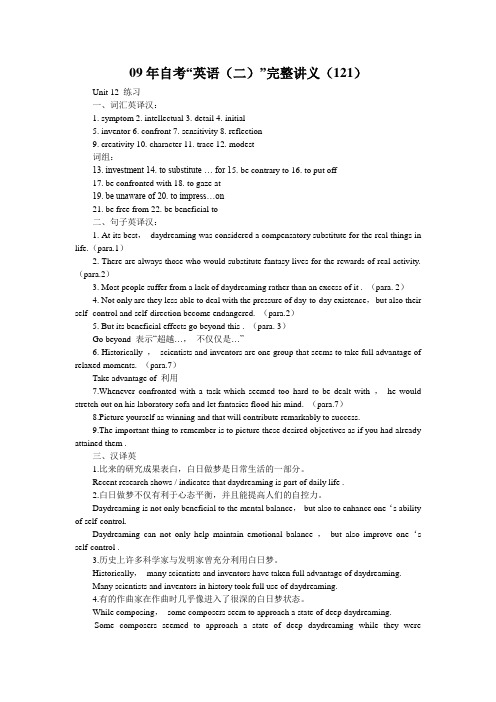
09年自考“英语(二)”完整讲义(121)Unit 12 练习一、词汇英译汉:1. symptom2. intellectual3. detail4. initial5. inventor6. confront7. sensitivity8. reflection9. creativity 10. character 11. trace 12. modest词组:13. investment 14. to substitute … for 15. be contrary to 16. to put off17. be confronted with 18. to gaze at19. be unaware of 20. to impress…on21. be free from 22. be beneficial to二、句子英译汉:1. At its best,daydreaming was considered a compensatory substitute for the real things in life.(para.1)2. There are always those who would substitute fantasy lives for the rewards of real activity.(para.2)3. Most people suffer from a lack of daydreaming rather than an excess of it . (para. 2)4. Not only are they less able to deal with the pressure of day-to-day existence,but also their self -control and self-direction become endangered. (para.2)5. But its beneficial effects go beyond this . (para. 3)Go beyond 表示“超越…,不仅仅是…”6. Historically ,scientists and inventors are one group that seems to take full advantage of relaxed moments. (para.7)Take advantage of 利用7.Whenever confronted with a task which seemed too hard to be dealt with ,he would stretch out on his laboratory sofa and let fantasies flood his mind. (para.7)8.Picture yourself as winning and that will contribute remarkably to success.9.The important thing to remember is to picture these desired objectives as if you had already attained them .三、汉译英1.比来的研究成果表白,白日做梦是日常生活的一部分。
(水滴系列)七年级英语下册 Unit 12 What did you do last weekend生词课讲义 (新版)人教新目标版

fly – flew(v.飞) kite(n.风筝) fly a kite(放
风筝) high(adj./adv.)高的(地)
He (flew a kite)放风筝,and
the kite flewhig(h
)高.
mouse(老鼠;耗子) (pl .mice)
ear(n.耳朵)
What does the MickeyM(ouse ) 老鼠 look like?
• 2. The Ss read the difficult words in a group.(The teacher walks around to see whether they have any questions.)
Ask the Ss to read after the tape, imitate their
played badmintion
We
(
)
打羽毛球 last
weekened.
What did … do last weekend ?
stay(v.停留;待)
stay up late(深夜不睡;熬
夜)十to do something
tired(adj.疲倦的;疲劳的)
She ( stayed up late to wo)rk
language n.语言
scared adj.惊慌的;吓坏了的
• 二. Remember the difficult and the most
useful words and phrases by matching
themselves with their meanings.
• 1.work as a teacher
butter(n.黄油)+fly(n.苍蝇 v.
Unit 12 What did you do last weekend(讲义及答案)
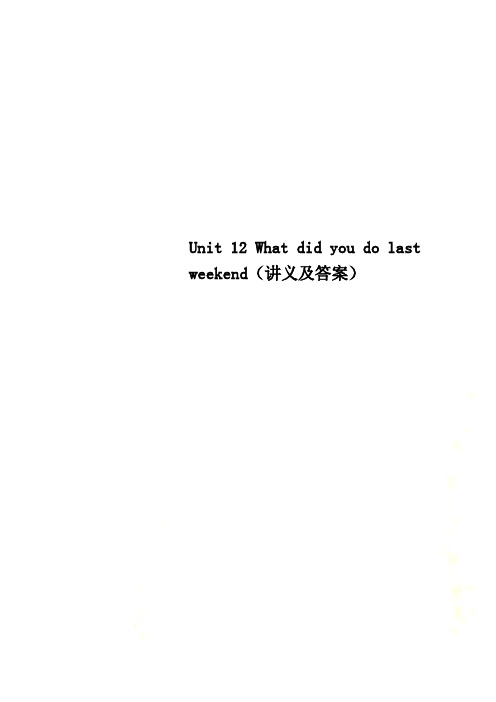
Unit 12 What did you do last weekend(讲义及答案)Unit 12 What did you do last weekend?(讲义)Part 1 Words and Expressionscamp /kæmp/ v. 扎营;搭帐篷lake /leɪk/ n. 湖;湖泊beach /biːtʃ/ n. 海滩;沙滩badminton /'bædmɪntən/n. 羽毛球运动sheep /ʃiːp/ n. 羊;绵羊as /æz/ prep. & adv. 作为;当作natural /'nætʃərəl/adj. 自然的butterfly /'bʌtə(r)flaɪ/ n. 蝴蝶visitor /'vɪzɪtə(r)/n. 游客;访问者tired /taɪə(r)d/adj. 疲倦的;疲劳的stay /steɪ/ v. 停留;待stay up late 深夜不睡;熬夜away /ə'weɪ/ adv. 离开;远离run away 跑开mouse /maʊs/ n. (pl. mice /maɪs/) 老鼠;耗子baby /'beɪbi/ adj. 幼小的n. 婴儿shout /ʃaʊt/ v. 呼叫;喊叫shout at …冲……大声叫嚷woof /wʊf/ interj. (狗叫声)汪汪language /'læŋgwɪdʒ/ n. 语言fly /flaɪ/ v. (flew /fluː/)飞kite /kaɪt/ n. 风筝fly a kite 放风筝high /haɪ/ adj. & adv. 高的(地)high school 中学ago /ə'gəʊ/ adv. 以前India /'ɪndiə/n. 印度tent /tent/ n. 帐篷put up 搭起;举起moon /muːn/ n. 月亮surprise /sə(r)'praɪz/ n. 惊奇;惊讶v. 使吃惊get a surprise 吃惊snake /sneɪk/ n. 蛇开始做某事surprise n. 惊奇;惊讶v. 使吃惊You didn’t know my surprise when I he ard that news.My sister and I got a terrible surprise yesterday.get a surprise 吃惊Jimmy’s words surprised me a lot.It surprised us to see Jane get up soearly. surprise sb. 使……吃惊n. 意想不到的事;惊喜It’s a lovely surprise to see youagain. I have a little surprise foryou.shout v. 呼叫;喊叫There’s no need to shout. I am notdeaf! We could hear them shoutingfor help. shout at…s hout to…The bus driver is shouting at the oldman. Don’t shout at me. I don’t likethat.I had to shout to Tom because he was so far from me.My mother shouted to me on the other side of the road, but I still couldn’t hear her w ords.shout at…对……叫嚷,多指因shout to…对……喊,多指因Part 2 Role-playRole-play the conversation.Paul: Hi, Lisa. How was yourweekend? Lisa: Great, thanks.Paul: What did you do?Lisa: I worked as a guide at the Natural HistoryMuseum. Paul: Really? How interesting!Lisa: Yeah, it was fun. They have butterfly house with over 200 kinds of butterflies! I told the visitors about themand their living habits. Did you have a good weekend? Paul: Yeah, it was good, but I’m kind of tired now. I stayed up late to watch the soccer game.How interesting!Look at the bird. How beautiful!I had a terrible weekend. How tired!Five hours ago we left Beijing on this train, but now we’re arriving in Shanghai! How fast!I got on the bus one hour ago. How slowly!how 引导感叹句,译为“多么……;真……”,后面接或。
初一下册英语第十二单元讲义unit 12 语法篇
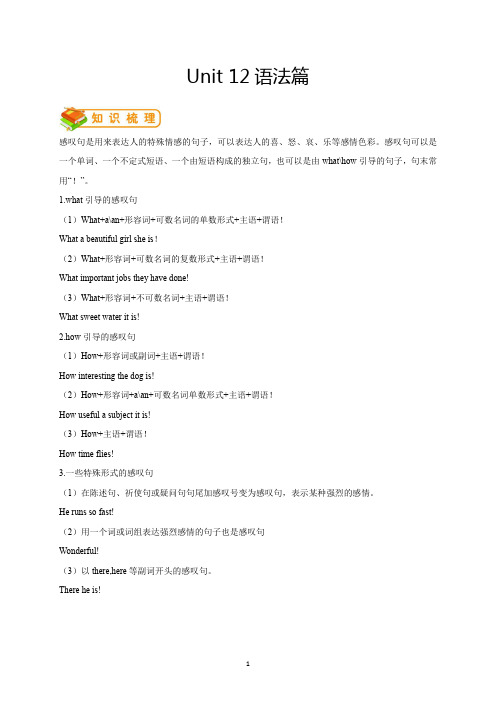
Unit 12语法篇感叹句是用来表达人的特殊情感的句子,可以表达人的喜、怒、哀、乐等感情色彩。
感叹句可以是一个单词、一个不定式短语、一个由短语构成的独立句,也可以是由what\how引导的句子,句末常用“!”。
1.what引导的感叹句(1)What+a\an+形容词+可数名词的单数形式+主语+谓语!What a beautiful girl she is!(2)What+形容词+可数名词的复数形式+主语+谓语!What important jobs they have done!(3)What+形容词+不可数名词+主语+谓语!What sweet water it is!2.how引导的感叹句(1)How+形容词或副词+主语+谓语!How interesting the dog is!(2)How+形容词+a\an+可数名词单数形式+主语+谓语!How useful a subject it is!(3)How+主语+谓语!How time flies!3.一些特殊形式的感叹句(1)在陈述句、祈使句或疑问句句尾加感叹号变为感叹句,表示某种强烈的感情。
He runs so fast!(2)用一个词或词组表达强烈感情的句子也是感叹句Wonderful!(3)以there,here等副词开头的感叹句。
There he is!选择疑问句提出两种或两种以上的情况,要求对方选择一种情况回答的问句叫选择疑问句。
选择疑问句中的两种或两种以上的情况用or连接,回答时不能使用yes或no,而要用一个完整的句子或其省略形式。
读选择疑问句时,语调一般是前升后降。
选择疑问句可以分为一般选择疑问句和特殊选择疑问句两种。
(1)一般选择疑问句:一般疑问句+or+被选择部分?--Do you like apples or bananas?--I like apples.(2)特殊选择疑问句:特殊疑问句,+A or B?--Which would you like better,tea or coffee?--Coffee better.单项选择1.__________great courage he showed!A.WhatB.What aC.How aD.How2.__________exciting news it is!A.WhatB.What anC.HowD.How an3.--__________a lovely girl she is!--So she is!A.WhatB.What aC.HowD.How a4.--Do you like listening pop music__________classic music?--Classic musicA.andB.orC.soD.but5.--__________do you like better,football or basketball?--Basketball.A.WhichB.WhereC.WhyD.What单项选择1. __________fast runner she is!A.WhatB.What aC.HowD.How a2.__________great picture!A.WhatB.What aC.HowD.How a3.__________bad weather it is!We can’t go boating.A.WhatB.What aC.HowD.How a4.--Can you tell me it is a dog_________a bear?--A dog.A.andB.orC.soD.but5.--__________do you want to visit,America or Canada?--Canada.A.WhichB.WhereC.WhyD.What单项选择1.__________a beautiful car it is!I have never seen it before.A.HowB.WhenC.WhoD.What2.--__________ it is today!--Yes,shall we go fishing?A.How fine weatherB.What fine weatherC.What a fine weatherD.How fine the weather3.--__________fine day!Shall we go for a walk?--That sounds great!A.WhatB.What aC.HowD.How a4.__________delicious the dish is!A.WhatB.What anC.HowD.How an5.__________ good time we had during the May Day holiday!A.HowB.WhereC.WhoD.What6.Who is your maths teacher,Lee_________Wang?A.andB.orC.soD.but7._________excited they are!A.WhatB.What anC.HowD.How an8.--_________is your maths teacher,Lee or Wang?--LeeA.WhoB.WhatC.WhenD.Where9.--It is said that a foreign teacher will teacher will teach us English next term.--Wow!__________!A.What an excited newsB.What a exciting newsC.How excited the news isD.How exciting news10.--Whose book is it,Lucy’s__________Lily’s?--Lily’sA.andB.orC.soD.but完形填空Probably you have seen photos of the Grand Canyon. But you must go there 1 to feel its size and beauty. The Grand Canyon is one of the greatest 2 wonders of the world.The Colorado River made the Grand Canyon over millions of years. Slowly, the river cut down 3 hard rocks. At the same time, the land was 4 . Today the canyon is very 5 . It’s also very 6 , about 20 kilo-meres. And 7 its height, there are different kinds of plants and animals on both sides of the canyon.The canyon looks different at different times of the day, and 8 different seasons and weather. At sunrise, the red, gold, brown and orange colors of the rocks are 9 clear and bright. Whether you see the Grand Canyon from the top or the bottom, it will be a(n) 10 that you will never forget.1. A. you B. your C. yours D. yourself2. A. natural B. modern C. ancient D. national3. A. along B. through C. across D. past4. A. rise B. rising C. rose D. risen5. A. more B. dangerous C. deep D. low6. A. long B. deep C. high D. wide7. A. as a result B. because of C. thanks to D. thanks for8. A. in B. on C. at D. for9. A. especially B. friendly C. hardly D. differently10. A. interview B. trip C. visit D. experience单项选择:1.__________good advice!A.WhatB.What anC.HowD.How an2.__________bad weather it is!We had better stay at home.A.WhatB.What aC.HowD.How a3.__________sweet music!A.WhatB.What aC.HowD.How a4.Playing games__________much time,I think.A.spendsB.takesesD.pays5.My family usually__________ music at the concert on holiday.A.listenB.hearC.hear ofD.listen to6.Mozart wrote__________piece of music for the classic orchestra.A.hundredB.hundreds ofC.hundred ofD.hundreds7.The boy works_________harder than his elder sister.A.evenB.veryC.prettyD.quite8.Sorry,I can’t play __________ basketball with you this afternoon.My father asked me to stay at home and play __________guitar.A.The,theB.\,\C.the,\D.\,the9.She can sing very well.She has a beautiful __________ .A.soundB.noiseC.voiceD.cry10.He will come here on time,__________?A.won’t heB.will heC.doesn’t heD.is he完形填空:Johnny Sylvester, eleven years old, was in bed in the hospital. A few days ago, when he was __1__in a football game, he fell and his head hit the ground. The doctors thought he might ___2____get well.“He seems to have given up hope. So medicine won’t ___3__. Maybe he needs something else,” said one of the doctors. “When I visit Johnny, all he ever says is that he would like to __4___ Babe Ruth.”To meet Babe Ruth, of course, was not possible. Babe Ruth was as important a man in America ___5___the president himself, and he was the most famous baseball player in the game.The next day Johnny’s father managed to __6__Babe Ruth about the story of Johnny on the phone.Twenty-four hours later, when Johnny lay in his ___7___room, in walked Babe Ruth. Young Johnny couldn’t believe it really was Babe.Babe Ruth sat down at Johnny’s bedside and said, “Now listen, kid, you’ve got to get well. I’ve bought you a new American League baseball. You must start ___8____it”Sylvester just stayed there, saying nothing.For Johnny this was the beginning of a new life, one he thought he would never __9__. To his doctors’ __10__, young Sylvester walked out of the hospital on his own a few weeks later. He was also able to live a healthy life---all because of the present of Babe Ruth.1. A. playing B. swimming C. riding D. growing2. A. always B. often C. usually D. never3. A. win B. do C. eat D. drink4. A. feed B. read C. meet D. defeat5. A. as B. than C. if D. until6. A. say B. speak C. tell D. talk7. A. hospital B. school C. village D. farm8. A. reading B. sweeping C. throwing D. making9. A. refuse B. see C. send D. agree10. A. experience B. opinion C. advice D. surprise阅读理解ASeveral summers ago, Joe Smith, the coach of a football team, and his family were spending their holiday in a small town. One rainy afternoon, it was impossible for them to go out to do anything interesting, so the family decided to go to the cinema. Joe, his wife and their children walked down to the town’s only cinema, bought tickets and went into the hall. The lights were still on, and there were just six other people there. As Joe entered, some of them saw him and started clapping (鼓掌).Joe gave th em a smile and turned to his wife. “Aha, I can’t believe they know me and I’m getting a warm welcome here,” he said, “I guess they saw my games on TV.”They sat down and then a young man came over and reached out his hand to shake hands with Joe. “Thanks a lot,” replied the coach, “I just can’t believe you know who I am.” The man looked puzzled (困惑的). “All I know,” replied the man, “is that they would not show the film until at least ten people bought tickets.”1. Joe and his family decided to go to the cinema because _________.A. they enjoyed seeing films in a small townB. it was impossible for Joe and his team to have a football match that afternoonC. they wanted to try something new for a changeD. nothing else could interest them on a rainy afternoon2. When Joe and his family got to the cinema __________.A. all the tickets had been sold outB. the film had been on for quite some timeC. people in the cinema were waiting anxiously (焦急地)D. everyone in the cinema was clapping3. How did Joe feel when he was given such a warm welcome?A. He felt surprisedB. He felt worriedC. He felt proudD. He felt both surprised and proud4. How many children did Joe have?A. At least oneB. At least twoC. At least threeD. At least five5. Why did the people in the cinema welcome Joe and his family so warmly?A. Because he was the coach of a football teamB. Because he and his family were new-comers in the small townC. Because they had seen Joe’s games on TVD. Because they could not see the film until enough people had arrivedBIn the big cities of Europe and America — London, Paris, New York, people are moving out of the city. They are usually rich families with much money, and they want to live a quieter life. They are tired of the noises and the dirty air of the city, tired of the crowded streets, crowded trains and buses. They don’t want to sit in traffic any more. They want a house with a garden, and clean air that is not polluted.So they move ou t. Some don’t move very far, just a little way out of the city, to the towns near the cities. Other people move to real countryside, with sheep, cows and horses, and green fields! There, they start new lives and try to make new friends.Not all those who move from the city to the countryside are happy. After two or three years, many people feel that it was a big mistake. There isn’t much to do. Country people are very different and aren’talways friendly.As a result, quite a lot of people move back to the city. “It’s wonderful to see crowds in the streets and cinema lights,” they say. “I’m so glad I’m back in the city!”1. Some city people move out of their city because of _____.A. crowds and pollutionB. friendly neighborhoodsC. making moneyD. cows and sheep2. Why do some people move back to the city again? Because _____.A. they can breathe fresh and clean airB. there are big shops and cinema lightsC. they still want to live their city lifeD. they can make many new friends3. Which of the following sentence is wrong according to the passage?A. Many people love their city’s colorful life.B. They enjoy seeing animals in the country.C. All the people move out far from the city.D. Sometimes country people are not friendly.CYou are watching a film in which two men are having a fight. They hit one another hard. At the start they only fight with their hands. But soon they begin hitting one another over the heads with chairs. And so it goes on until one of the men crashes (撞击) through a window and falls thirty feet to the ground below. He is dead!Of course he isn't really dead. With any luck he isn't even hurt. Why? Because the men who fall out of high windows or jump from fast moving trains, who crash cars of even catch fire, are well trained. They do this for a living. These men are called stuntmen. That is to say, they perform tricks (花招,手段). Here are two sides to their work. They do most of the things you see on the screen. For example, they fall from a high building. However, they do not fall on to hard ground but on to empty cardboard boxes covered with a mattress (床垫). Again, when they hit one another with chairs, the chairs are made of soft wood and when they crash through windows, the glass is made of sugar! But although their work depends on trick of this sort, it also requires a high degree of skill and training. Often a stuntman success depends on careful timing. For example, when he is "blown up" in a battle scene, he has to jump out of the way of theexplosion just at the right moment.Naturally stuntmen are well paid for their work, but they lead dangerous lives. They often get seriously hurt, and sometimes killed. A Norwegian stuntman, for example, flew over the edge of a cliff (悬崖) a thousand feet high. His parachute (降落伞) failed to open, and he was killed. Although it is full of deadly dangers, this is no longer the work for men only. Men no longer dress up as women when actresses have to perform some dangerous actions. For nowadays there are stuntman too!1. Stuntmen are those who ______.A. often dress up as famous actorsB. prefer to lead dangerous livesC. often perform dangerous actionsD. often fight each other for their lives2. What’s the meaning of the underlined sentences in the first paragraph?A stuntman should _______.A. crash bravely though a window made of sugarB. do the well-planned activity at a very momentC. open his parachute when he jumps down the cliffD. have got a high degree of skill and training3. Which could probably the best title of this passage?A. Fights in the Movies.B. Crashing Out of the Window.C. Exciting Films Today.D. Most Dangerous Work.。
人教版九年级英语unit 12单词讲义

人教版九年级英语单词讲义Unit121.unexpected /ˌʌnɪkˈspektɪd/ adj.出乎意料的;始料不及的un否定前缀+expect 期望(expect sb. to do sth.____________________)+ed形容词的后缀(表示希望,期望做某事,类似用法:hope to do sth./wish sb. to do sth.)2.by the time… 在……以前(过去完成时标志词had done)3.backpack / 'bækpæk / n.旅行包back后背+pack包handbag手提包4.oversleep / ˌəʊvə'sli:p / v.(overslept/ˌəʊvə'sli:p/, overslept) 睡过头;睡得太久over超过+sleep睡觉sleep睡觉(asleep入睡fall asleep)sleepy困倦的overcome克服5.ring /rɪŋ/ v.(rang/ræŋ/,rung/rʌŋ/)(钟、铃等)鸣;响6.give ... a lift 捎……一程同义pick up:_________,___________,__________7.block / blɒk / n. 街区8.in line with (与……)成一排9.worker /'wɜ:kə(r)/ n. 工作者;工人work__________(不可数),_________(可数)+er10.stare / steə(r) / v. 盯着看;凝视stare at_________ It’s impolite to stare at others.盯着别人看是不礼貌的。
11.disbelief /ˌdɪsbɪˈli:f / n. 不信;怀疑dis否定前缀+belief(名词相信,动词believe)12.above /əˈbʌv / adv. 在上面prep. 在⋯⋯上面(正上方)在....下面(正下面)under over上方below下方13.burn /bɜ:n/ v. (burnt /bɜ:nt/, burned /bɜ:nd/;burnt, burned) 着火;燃烧sunburned晒伤14.burning /'bɜ:nɪŋ/ adj.着火的;燃烧的15.alive /ə'laɪv / adj. 活着;有生气的a+live(生活)active活跃的16.airport /'eəpɔ:t/ n.机场air空气+port地点后缀by air坐飞机17.till / tɪl/ conj. & prep. 到;直到until直到18.west / west / adv. 向西;朝西adj. 向西的;西部的n. 西;西方east东south南north北变形容词在后加ern western西方的19.cream / kri:m / n. 奶油;乳脂ice-cream冰淇淋20.workday /ˈwɜ:kdeɪ/ n.工作日weekday_________ weekend________ 写出星期日至星期六:21.pie / paɪ/ n. 果馅饼;果馅派apple pie苹果饼22.show up 赶到;露面We waited for two hours but Mr. Shao didn't show up.我们等了两小时,邵老师没出现。
沪教版四年级上册英语Unit12 Weather讲义

Unit 12 Weather 一、基本知识点(一)词汇:weather [ˈwɛðər]rainy ['reɪnɪ]cloudy ['klaʊdɪ]windy ['wɪndɪ]sunny ['sʌnɪ]Sunday ['sʌndeɪ]cloud [klaʊd]rain [reɪn](二)短语:ride bikego to the parkin the parkfly kitego out to play(三)句型:1. How’s the weather today? .今天的天气怎么样?2. It’s warm and sunny. It’s Sunday, let’s go to the park它温暖又晴朗。
今天星期天,我们去公园吧。
3. I can ride my bike in the park.我能在公园里骑自行车4.I like the rain.我喜欢雨。
5. I don't like the rain.我不喜欢雨。
6I like the wind.I can fly my bike.我喜欢风,我可以放我的风筝。
7.I can’t play in the park.我不能在公园玩。
(四)重难点、易错点:1. it is +形容词It is rainy.2.对天气的询问How’s the weather? How’s==how is3.对情态动词can 的否定句在情态动词后面直接加not4.掌握描述天气的词语:注意名词和形容词cloud---cloudy wind--windy sun--sunny rain--rainy5.写作:学会如何描述天气,以及自己的喜好和能力。
It is ________________________________ 天气I like________________________________喜好I don’t like _________________________喜好I can________________________________能力I can’t_______________________________能力二、典型例题1. How ________ the weather?A. isB. areC. be 【解析】答案:A How is the weather?固定句型。
人教版英语九年级下册(讲义)Unit 12 ——过去完成时(基础训练)
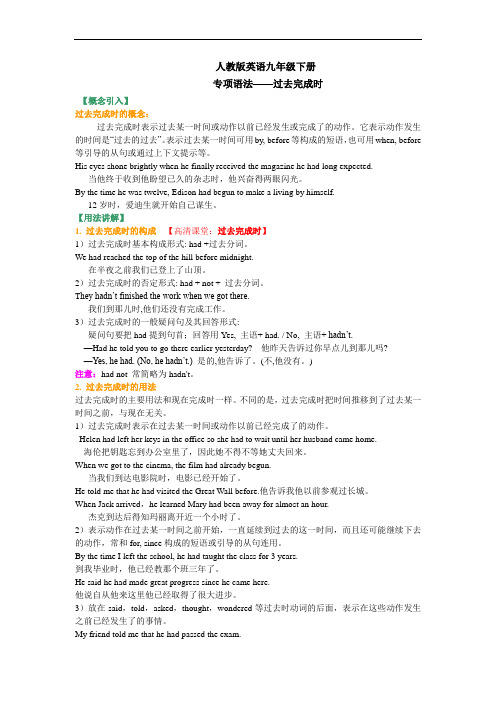
人教版英语九年级下册专项语法——过去完成时【概念引入】过去完成时的概念:过去完成时表示过去某一时间或动作以前已经发生或完成了的动作。
它表示动作发生的时间是“过去的过去”。
表示过去某一时间可用by, before等构成的短语,也可用when, before 等引导的从句或通过上下文提示等。
His eyes shone brightly when he finally received the magazine he had long expected.当他终于收到他盼望已久的杂志时,他兴奋得两眼闪光。
By the time he was twelve, Edison had begun to make a living by himself.12岁时,爱迪生就开始自己谋生。
【用法讲解】1. 过去完成时的构成【高清课堂:过去完成时】1)过去完成时基本构成形式: had +过去分词。
We had reached the top of the hill before midnight.在半夜之前我们已登上了山顶。
2)过去完成时的否定形式: had + not + 过去分词。
T hey hadn’t finished the work when we got there.我们到那儿时,他们还没有完成工作。
3)过去完成时的一般疑问句及其回答形式:疑问句要把had提到句首;回答用Yes, 主语+ had. / No, 主语+ hadn’t.—Had he told you to go there earlier yesterday? 他昨天告诉过你早点儿到那儿吗? —Yes, he had. (No, he hadn’t.) 是的,他告诉了。
(不,他没有。
)注意:had not 常简略为hadn't。
2. 过去完成时的用法过去完成时的主要用法和现在完成时一样。
不同的是,过去完成时把时间推移到了过去某一时间之前,与现在无关。
2016年自考英语二教材课文讲义unit12

Unit 12 A Break from LifeI. New words and expressions New words1. cranky adj. 脾气坏的2. laundry n. 要(或正在)洗的衣物;刚洗好的衣物3. resemble v. 看起来像;显得像;像resemble: take afterresemblance4. throb n. (强烈有规律的)跳动;阵阵的疼痛5. subside v. 趋于平静;平息;减弱;消退6. ache v. 疼痛;隐痛7. joint n. 关节8. shuffle v. 拖着脚走9. wiggle v. (使)扭动,摆动,摇动10. sniffle n. 抽鼻子(声)11. tissue n. (尤指用作手帕的)纸巾,手巾纸12. pillow n. 枕头13. crack v. 找到解决(难题等的)方法14. contagious adj. 患接触性传染病的15. germ n. 微生物;细菌;病菌精选文库16. resourceful adj. 机敏的;足智多谋的;随机应变的17. scrounge v. 觅取;搜寻18. nurture v. 养育;养护;培养19. chore n. 令人厌烦的任务、乏味无聊的工作20. respite n. 暂停;暂缓21. manufacture v. 编造;捏造22. symptom n. 症状23. pamper v. 细心照顾;精心护理;娇惯;纵容24. hermit n. 隐土;隐修者;遁世者25. gel n. 凝胶,冻胶(尤指用于头发或护肤的产品)26. hearty adj. 大的;丰盛的27. chamomile n. 苹果菊;春黄菊;甘菊28. vanilla-scented adj. 香草味的29. gingerly adv. 谨慎地;小心翼翼地;轻手轻脚地30. grateful adj. 感激的;表示感谢的be grateful to sb. for sth.ungrateful比较:gracefuldisgraceful31. spa n. 水疗32. tub n. 浴缸;浴盆33. drain n. 下水道;排水管34. refresh v. 使恢复精力;使凉爽35. emotionally adv. 感情上地;情感上地emotionemotional36. empower v. 增加(某人的)自主权;使控制局势37. permission n. 准许;许可;批准permit38. justify v. 对…作出解释;为…辩解(或辩护)39. awareness n. 知道;认识;意识Phrases and Expressions1. pile up 堆积;积压2. come down with患,得,染上(小病)3. slip away 消失;消亡;死去4. respond to 作出反馈;响应5. care for 照顾,照料(病、老、幼者等)6. tend to 照料;照管;护理II. Text LearningFeeling Free①I woke up feeling cranky. I didn't want to do housework, though the laundry was piling up. I didn't want to read the work I brought home from the office. I didn't want to do anything that resembled responsible behavior. It was that kind of day.(承上总结句)②As I drank my morning tea, I thought I felt a headache coming on. Yes, there it was, a dull throb just behind my eyes. Maybe I should go back to bed until it subsided. As I put the dishes in the sink, it seemed that my muscles were beginning to ache. Or was the ache in my joints? That could mean I was coming down with the flu. (承上启下句)Everyone I knew had the flu this year. Why should I be the one to escape it? I absolutely should be in bed.③I shuffled back to bed, wiggled under the covers and shut my eyes. (1)Another couple of hours of sleep would be so nice, but I was already completely awake. I ought to get up. But no, there was that headache and the beginning of a sniffle. Better get the tissues.本部分重点及难点:1. Another couple of hours of sleep would be so nice, but I was already completely awake.be completely / wide awakebe fast / sound asleep④On my way back from the bathroom with a family-sized(适合全家用的)tissue box,I stopped to grab that big new novel I had bought but had no time to read. I opened the book and settled against the pillows.⑤The morning was moving along and so was my reading. Another twenty pages and I was stretching. I should try to crack(找到解决办法)the report I was working on. I should at least get up and do the wash. What if I was contagious? I certainly didn't wantto spread any germs. The wash could wait. (2)My family was resourceful enough toscrounge clothing for the next day.⑥Maybe I wasn't actually getting the flu. I didn't really want to be sick. To be truthful, all I wanted was a little time off. (3)I needed to nurture myself away from people, chores, career and the outside world. Did I have to wait to be sick to do that? As a child, the only respite from school or family chores was illness. But I wasn't a child any more.(4)Did I have to manufacture symptoms to provide myself with an excuse? No, I decided,I didn't.本部分重点及难点:2. My family was resourceful enough to scrounge clothing for the next day.家人足够有能力找到第二天能穿的衣服。
人教版九年级英语unit 12阅读讲义

人教版九年级英语unit 12阅读讲义本篇阅读讲义主要介绍了人教版九年级英语教材中的第十二单元内容。
该单元主要包括课文阅读和相关练,旨在帮助学生提高英语阅读能力。
课文阅读Text 1: Life in the Future本文通过描绘未来的生活给我们展示了科技进步的惊人成果。
未来的家庭将拥有智能家居,可以通过人工智能完成各种任务。
汽车将变得更加智能,可以自动驾驶。
人们还可以通过虚拟现实技术参观各种国家和地方。
总之,未来的生活将更加便捷、舒适和有趣。
Text 2: Amazing Inventions本文介绍了几项令人惊叹的发明。
其中包括智能手表、智能眼镜和智能翻译机。
智能手表可以跟踪我们的健康状况,智能眼镜可以提供增强现实体验,智能翻译机可以帮助我们在不同语言之间进行交流。
这些发明将极大地改变我们的生活方式和交流方式。
Text 3: Future Jobs本文介绍了一些未来可能出现的职业。
随着科技的发展,许多新职业将诞生。
例如,无人机驾驶员、虚拟现实设计师和机器人工程师等。
这些职业将需要不同的技能和知识,年轻人应该努力研究和适应这些新的职业需求。
阅读练1. 根据Text 1的内容回答问题:未来的生活将会变得怎样?2. 根据Text 2的内容选择正确的描述:智能翻译机可以做什么?- A. 跟踪健康状况- B. 提供增强现实体验- C. 帮助在不同语言之间交流3. 根据Text 3的内容回答问题:未来可能出现的职业有哪些?请根据你的教材进行阅读和练,以提高你的英语阅读能力。
Unit12周末讲义人教版九年级英语全册
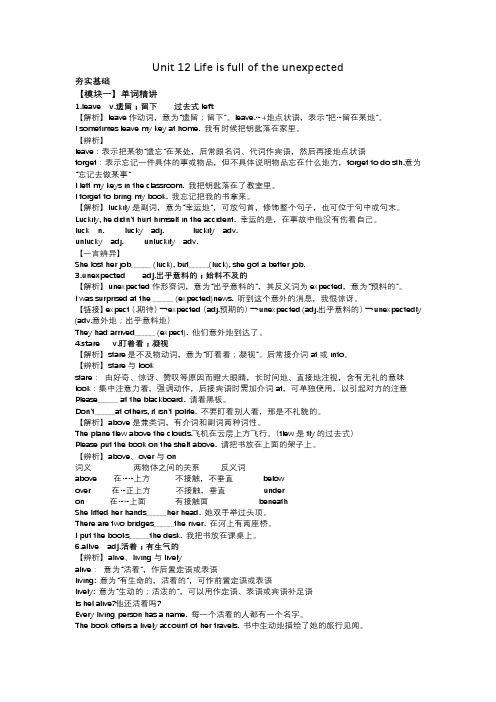
Unit 12 Life is full of the unexpected夯实基础【模块一】单词精讲1.leave v.遗留;留下过去式left【解析】leave作动词,意为“遗留;留下”。
leave.…+地点状语,表示“把…留在某地”。
I sometimes leave my key at home. 我有时候把钥匙落在家里。
【辨析】leave:表示把某物“遗忘”在某处,后常跟名词、代词作宾语,然后再接地点状语forget:表示忘记一件具体的事或物品,但不具体说明物品忘在什么地方,forget to do sth.意为“忘记去做某事”I left my keys in the classroom. 我把钥匙落在了教室里。
I forget to bring my book. 我忘记把我的书拿来。
【解析】luckily是副词,意为“幸运地”,可放句首,修饰整个句子,也可位于句中或句末。
Luckily, he didn't hurt himself in the accident. 幸运的是,在事故中他没有伤着自己。
luck n. lucky adj. luckily adv.unlucky adj. unluckily adv.【一言辨异】She lost her job______ (luck), but______(luck), she got a better job.3.unexpected adj.出乎意料的;始料不及的【解析】unexpected作形容词,意为“出乎意料的”,其反义词为expected,意为“预料的”。
I was surprised at the ______ (expected)news. 听到这个意外的消息,我很惊讶。
【链接】expect(.期待)→expected(adj.预期的)→unexpected (adj.出乎意料的)→unexpectedly (adv.意外地;出乎意料地)They had arrived______ (expect). 他们意外地到达了。
沪教版六年级上册英语Unit 12 The Earth讲义(学生版)
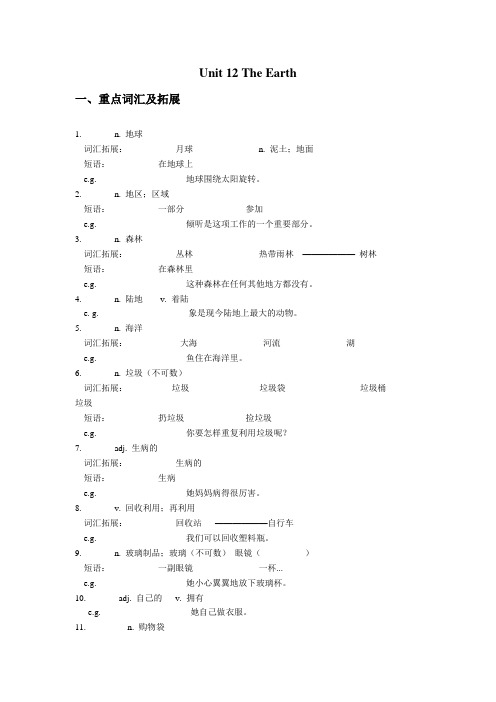
Unit 12 The Earth一、重点词汇及拓展1. _____ n. 地球词汇拓展:__________ 月球__________ n. 泥土;地面短语:__________ 在地球上e.g. ___________________ 地球围绕太阳旋转。
2. _____ n. 地区;区域短语:__________ 一部分__________ 参加e.g. ___________________ 倾听是这项工作的一个重要部分。
3. _____ n. 森林词汇拓展:__________ 丛林__________ 热带雨林——————树林短语:__________ 在森林里e.g. ___________________ 这种森林在任何其他地方都没有。
4. _____ n. 陆地v. 着陆e. g. ___________________ 象是现今陆地上最大的动物。
5. _____ n. 海洋词汇拓展:__________ 大海__________ 河流__________ 湖e.g. ___________________ 鱼住在海洋里。
6. _____ n. 垃圾(不可数)词汇拓展:__________ 垃圾__________ 垃圾袋__________ 垃圾桶_______ 垃圾短语:__________ 扔垃圾__________ 捡垃圾e.g. ___________________ 你要怎样重复利用垃圾呢?7. _____ adj. 生病的词汇拓展:__________ 生病的短语:__________ 生病e.g. ___________________ 她妈妈病得很厉害。
8. _____ v. 回收利用;再利用词汇拓展:__________ 回收站——————自行车e.g. ___________________ 我们可以回收塑料瓶。
9. _____ n. 玻璃制品;玻璃(不可数)眼镜(__________)短语:__________ 一副眼镜__________ 一杯...e.g. ___________________ 她小心翼翼地放下玻璃杯。
- 1、下载文档前请自行甄别文档内容的完整性,平台不提供额外的编辑、内容补充、找答案等附加服务。
- 2、"仅部分预览"的文档,不可在线预览部分如存在完整性等问题,可反馈申请退款(可完整预览的文档不适用该条件!)。
- 3、如文档侵犯您的权益,请联系客服反馈,我们会尽快为您处理(人工客服工作时间:9:00-18:30)。
Unit12必备短语1.不得不,必须;2.在走廊里3.上课迟到;4.听音乐5.在教室里;6戴帽子7在学校;8.穿校服9不许讲话;10 在上学的晚上11太多的;12.上床睡觉14.学钢琴;15家庭规则16骑自行车;17戴头盔18大声说话重点新词1.fight(v)打架,争吵eg. The boys are fighting.固定搭配Fight for 为事业,自由,权利,真理而斗争/ 战斗eg: They are fighting for freedom. 他么为自由而战。
Fight against 为反对…..而斗争,与….战斗,和…..打架They fight against the enemy. 他们和敌人战斗。
Fight with 同….战斗,打架Don’t fight with him any more. 不要再和他打架了。
2.outside (adv.)外面的,在外部的Children like to play outside.反义词inside 在里面,向里面拓展(1)介词(prep.)在….外面,到….外边去My parents live in a village outside the city.(2 ) 名词(n)外面,外部go to the outside 到外面去(3)外面的,在外部的They need the outside help.3.else (adj/adv) 其他的,别的,另外的Eg. I have nothing else to do. 我没有别的事可做。
Where else did you go? 你还去过其他地方吗?3.by(prep) 到(某时)之前,不迟于,后面常接时间点You must come back by eight o’clock. 你必须在八点前回来。
4.wash(v) 洗,洗涤she washed her face and hands. 她把脸和手都洗了。
固定搭配do some washing 洗衣服ter (adv.) 后来,以后see you later. 再见。
I will tell you all about later. 以后我将把这一切都告诉你。
拓展later 还可以用于late(adj/adv) 的比较级He came later than me. 他比我来得晚。
6.loudly(adv) 大声地,多与speak, talk, laugh, sing ,read等动词连用。
They are talking loudly. 他们在大声地说话。
拓展loud(adj) 大声的,响亮的He has a loud voice. 他嗓门大。
本章重点语法-----祈使句和情态动词can 的用法(一)祈使句表示请求,命令,叮嘱,邀请,劝告等。
祈使句又叫做无主句,其谓语动词用原形。
祈使句的四大类型:1.B型祈使句:be动词+其他eg: Be careful next time. 下次要细心。
2.V型祈使句:动词原形+其他。
Open the window, please.注意:这种句型变否定时要在动词原形前加Don’tDon’t open the window, please.3.L型祈使句:Let +sb+动词原形+ 其他否定形式Let +sb+not+动词原形+ 其他或者在句首加Don’t Eg: Let’s go camping. 咱们去野营吧。
否:Let’s not go camping.4No + 动词-ing 表示禁止eg: No talking! 禁止说话!注意:祈使句变反义疑问句用“will you/ won’t you?”而let’s….句型用shall we?Let us 句型用will you?(考试经常考二者区别,一定记牢!)Eg: Don’t be late for school, will you?Let’s go for a drive, shall we?Let us go for a drive, will you?(二)情态动词can的用法情态动词can无人称和数的变化,过去式是could, 后接动词原形,否定句在can的后加not,英文句将can提到句首。
1,c an 表示可能,意为:可能,可以He can run here in five minutes.2,C an 表示能力,意为:能,会He can swim.3,C an 表示允许,意为:可以You can ride my bike.重难点解析:1. 情态动词have to 的用法,意思是"必须、不得不",它侧重于客观上的必要和外界的权威。
(1)结构:主语+have to+动词原形+其他(一般现在时,主语是第三人称单数时,用has to;句子是过去时,用had to.)如:We have to wear sneakers for gym class. 在体育课上,我们必须穿运动鞋。
Tom has to practice the guitar every day. 汤姆每天必须练习弹吉它。
I had to get up at 5:00 am last Monday. 上周一,我不得不早上5点起床。
(2)否定形式:主语+don't have to+动词原形+其他(一般现在时,主语是第三人称单数时,用doesn't have to. 句子是过去时,用didn't have to)如:Nick doesn't have to wear a uniform. 尼克不必穿制服。
We didn't have to do our homework at once. 我们不必马上完成作业。
(3)疑问句:Do (Does或Did)+主语+have to +动词原形+其他如:Do you have to stay at home on weekends? 周末你必须呆在家里吗?Yes, I do. / No, I don't.是的,我必须。
不,我不必。
Did he have to go to bed by 11:00 last night? 昨晚,他不得不11点前上床睡觉吗?2.hear,listen和sound都有"听"的意思,但三者是有区别的。
(1)hear"听说",侧重于"听"的内容I'm sorry to hear that you are ill. 听说你生病了,我很难过。
I never heard such an interesting story. 我从来没听过这么有趣的一个故事。
(2)listen"听"侧重于"听"这一动作。
Listen to me carefully. 认真听我说。
The children like to listen to music. 孩子们喜欢听音乐。
(3)sound"听起来",它是系动词,后面接形容词等。
That sounds great. 那听起来真不错。
It sounds like fun. 听起来挺有趣。
3. be in bed "在床上、卧床"in 和bed之间不能用冠词,bed也不用复数。
He is in bed for 10 years. 他卧床10年了。
Dave has to be in bed early every night.大卫每晚必须很早睡4. arrive late for 与be late for 意思相近,"迟到"Don't arrive (be)late for school. 上学别迟到。
I arrived (was)late for the meeting yesterday. 我昨天开会迟到了5. No talking ! "禁止交谈!"no后面加上名词或动名词(doing)也表示不要做某事。
与don't +do的用法相似。
No wet umbrellas! / Don't put wet umbrellas here! 禁止放湿雨伞!No food! Don't eat food here! 禁止吃食物!No smoking! Don't smoke here! 禁止吸烟!6.too many 和too much 的用法too many 表示:太多,后面可接可数名词的复数形式There are too many people in the street.Too much 表示:太多。
其后接不可数名词There is too much water on the floor.Much too 表示:太…. 其后常接形容词Alice can’t go to school. She is much too young.单词部分练习用所给词的适当形式填空(一)else , rule, classroom, fight, outside(1-5题)1.What are the ________ at your school?2.The teacher is standing in the front of the ________.3.The teacher asked the boys not to _______.4.It’s very cold________ . Come in ,please.5.What ________ did you do?6.Please help me w_______ the dishes.7.I have to be in bed b_____ eleven o’clock.8.I have to go to the supermarket l______.(二)用所给词的适当形式填空1. Mary is only four years old, but she can _________(read).2.______(not arrive) late for school.3.She practices __________(play) the piano every day.4.Don’t ______(eat) in the classroom.5,He enjoys _________(listen) to pop music.6.Thank you for_________(help) us.7.The people here are very _______(friend).8 Does Tom have to _______(do) his homework by five?9.It’s time _______(see) an interesting talk show.10. Would you like ______(help) me ______(practice) the violin?11.They had a lot of fun ________(swim) in the river last Monday.12---When ______ you ______ (visit) your grandmother?---Yesterday morning.13. Today is my sister’s birthday. What about _______(have) a party?14. Everyone dislikes ________(thief). When people meet them, they may call 110.15. Miss Zhang teaches _________(they) history.16. Take the ________(three) turning on the right.17. Is the hotel _______(cross) from a big supermarket?18.We are enjoying_______(swim) in the pool now. It’s too hot today.19.Let her________ (give ) you a hand.20---Where_______your new friends Tom ________(come) from?--- He comes from America.21.She _________(dance) very well. Now she _______ (dance) in the park.22.It’s snowing heavily. It’s ______(snow) today.23Thank you for ________(take) me to the zoo.24.What about ________(eat) some noodles?25.I _______(write) a new song last week.26.They went to the bookstore because they wanted _______(buy) books.27.Linda _______(listen) to the teacher now..28.Sometimes Lisa _______(go) to bed very late at night.29.Let’s ________(take) some books to the classroom.30.Mrs .Brown_________(cook) at home now.31. Your friends often______(wait) for you near here.32. Would you like ______(eat) some noodles?二.单项选择1----Can you play the piano?-----Yes, I______. I often practice it on weekends.A needn’tB needC can’tD can2.----_______ you swim?-----Yes ,but I’m not a goof swimmer.A CanB MayC NeedD Must3---______ you speak Japanese?---No, I can’t.A CanB MustC MayD Should4----Sorry for being late again.----______here on time next time, or you’ll be punished.A BeB BeingC To beD Been5.The little boy is ______ fat, because he eats ______rich foodA too mush, too muchB too much, much tooC much too, too manyD much too, too much.6.Health is very important to us. We should eat more vegetables and fruit instead of _______ rich food.A too muchB much tooC very much D. too many7.The radio isn’t_______ enough .Could you turn it up?A loudB loudlyC louderD loudest8.---I’m leaving now.---_______you turn off the lights.A To make sureB Make sureC Make sureD Making sure9.----Who’s that man under the tree?Is it Mr Black, our new English teacher?----It _____ be. Mr. Black has gone to Shanghai for a holiday.A mustn’tB can’tC needn’tD shouldn’t10. ----This desk is so heavy. I ________ move it. Could you help me?----- No problem.A canB can’tC shouldD shouldn’t11. Please _______ look outside. Look at the blackboard.A notB aren’tC don’tD can’t12. Emily is a good girl. She always _______ her school early and helps the other students clean the classroom,.A arrivesB arrives atC arrive atD arrived13.We can’t listen to music in the hallways, _______ we can listen to it outside.A andB soC butD or14. The boy has to wear _______ uniform at his school.A hisB herC /D some15. _______you have to make dinner after school?A. Are B Were C Have D Do16. You can’t eat in the classroom, ______ hallways.A andB butC orD /17. Dave , you have to wear your _______ for gym class.A sport shoeB sunglassesC sports shoesD shirt18.Do you get to school ______ 7:10 every morning?A byB inC onD for19. When you are late for class, your teacher may say, “_______”A Don’t run in the hallwaysB Don’t go out on school nightsC Do your homework after classD Don’t arrive late for class20. I have ______ things to do today.A too manyB too muchC much tooD very much21. I don’t like _______A onions, tea, or porridgeB onions, tea, and porridgeC onion, tea, or porridgeD onion, tea and porridge22.—Did you have a good time last Friday?--- Yes, I did. I really ______ it.A hateB enjoysC forgotD enjoy23.The pay phone is ____ Green Street and it’s across ______ the hotel.A in, toB on, formC at, throughD in, through24. Her parents often ______ after dinner.A take a walkB takes a walkC take to walkD take a walking27. You’re a little bit ______. You should eat less food, and take more exercise.A thinB tallC popularD heavy28.----What does Linda look like?----_______.A She is from CanadaB She is a studentC She’ s tall with long hair.D I like her very much.29. Could you ______me some food when you come herer?A takeB showC bringD have30.---Where _____ you go yesterday?---I ______ to the beach.A did, wentB did, goC do, goD do, went31---Did you have the breakfast this morning?---_____. That’s why I’m so hungry mow.A Yes, I had.B No, I haven’tC Yes, I haveD No, I didn’t完型填空练习ABC RadioJim Green is an announcer(播音员)for the program.Most of the girls___1____ boys like the program. They ___2___like Jim Green. Some of them often make phone calls to him and thank him ___3___ his work. There are lots of ___4___ to him every day,too.Jim Green gets up at 6:00 every morning.He has bread and a glass of milk ___5___ breakfast. He leaves home at 6:30 and ___6___ his office at 7:15.The program ___7____ at 7:30.He plays the new records (唱片)of the pop songs and modern music for his listeners. At 8:00 it's time ____8____ the news.Jim finishes work at 10:30. He goes home ____9____ his car.He ___10___ newspaper and listens to music after supper.He thinks his life is very interesting.( )1.A and B with C but D about( )2.A too B to C also D so( )3.A to B for C fo D and( )4.A letter B letters C friends D words( )5.A at B with C for D to( )6.A goes B gets C gets to D gets up( )7.A begins B finishes C over D start( )8.A to B for C of D in( )9.A by B in C on D takes( )10.A looks B reads C sees D watches二、You\'ll see a new _1_at a hospitai near London if you go there.He is very clever,_2_he never speaks.He can work 24 hours a day and never gets _3_.He is one metre tall and has a face_4_a TV screen.He is Dr.Robot.Doctors often need to ask their patients a lot of questions._5_ doctors can only spend a few minutes with such patient.But Dr.Robot,a human doctor can_8_a lot of uesful information(信息)when he meets his patient.How can Dr.Robot do this? A computer \"tell\" him what to do.Dr.Robot can do a lot of things people can do,though he can\'t completely_9_the place of _10_ doctors.( )1.A.sick person B.nurse C.chemist D.doctor( )2.A.so B.if C.but D.because ( )3.A.tired B.off C.up D.woounded ( )4.A.like B.on C.as D.in( )5.A.Kind B.Busy C.Free D.Tall( )te B.impossible C.necessary D.interesting ( )7.A.With B.For C.Behind D.Under ( )8.A.spend B.have C.send D.speak ( )9.A.bring B.give C.take D.lead ( )10.A.robot puter C.women D.human阅读理解(一)There is a car race near our town every year. In 1995,there was a very big race.There were hundreds of people there. My wife and I were at the race. Our friends Julie and Jack were there, too. You can see us in the crowd. We are standing on the left. There were twenty cars in the race.There were English cars, French cars, Geman cars, Italian cars, American cars and Japanese cars. It was an exciting finish. The winner was Billy Stewart. He was in car number fifteen. Five other cars were just behind him. On the way home, my wife said to me, “Don’t drive so quickly!You’re not Billy Stewart!”1.Is there a car race near our town every year? _________________2.How many people are there in the big race of 1995? _____________3.Who was at the race with the author(作者)? ______________________4.Are they standing on the left?_____________________5.Were there thirty cars in the race?____________________6.Were there any Chinese cars in the race?__________________7.The finish was exciting, wasn’t it?_______________8.Who was the winner of the race?__________________(二)Nigel is our new next-door neighbour. He’s a pilot. He was in the R.F.A. He will fly to New York next month. The month after next he’ll fly to Tokyo. At the moment, he’s in Madrid. He flew to Spain a week ago. He’ll return to London the week after next . He’s only forty-one years old, and he has already been to nearly every country in the world. Nigel is a very lucky man. But his wife isn’t very lucky. She usually stays at home!1. Nigel’s job is a ________. A. teacher B. doctor C. actor D. pelot2. ____ Nigel will fly to Tokyo. A.next month B.the month after next C.a week before D.We don’t know in the text.3. How old wil he be the next year?__________ A.forty B. forty-one C. forty-two D. forty-three4. What does Nigel’s wife usually do?A. Goes to every country in the world with Nigel.B.Goes to workC. Fly to New York and London.D. Stays at home.5. Is Nigel’s wife lucky? A. Yes, she is. B. No, she isn’t. C. She is lucky. D.No, she is.。
